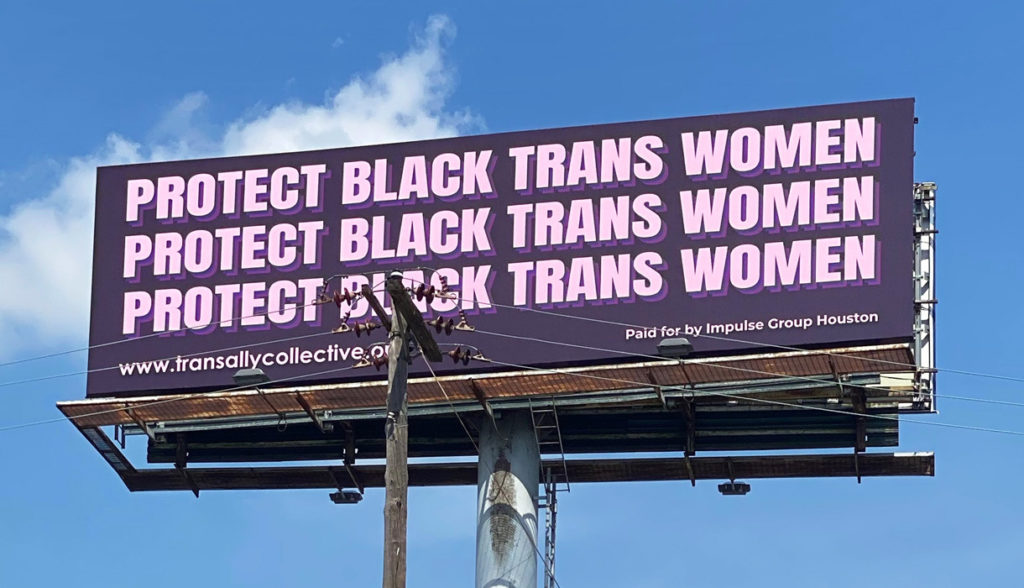
Billboard on I-10 proclaims ‘Protect Black Trans Women’
August public-awareness campaign kickstarts the launch of Transgender Ally Collective.

A new transgender advocacy group has erected a billboard that reads “Protect Black Trans Women” on I-10 at Gregg Street just east of downtown.
The Transgender Ally Collective (TAC) was founded in early August by four local LGBTQ grassroots organizations—The Mahogany Project Inc., Impulse Group Houston, Sister to Sister Support Group, and The Normal Anomaly—to uplift and help Black trans people. An official unveiling for the group’s Fifth Ward structure, which was designed by trans artist Crimson Jordan, will occur during a virtual press conference at 2 p.m. Sunday, August 9 beneath the billboard. The conference will be live-streamed on the Impulse Group Houston and The Mahogany Project’s Facebook pages.
At the conference, TAC’s founders will announce what the organization plans to do next to serve Black trans people. The event will also feature words from congresswoman Sheila Jackson Lee and national trans activist Dee Dee Watters, in addition to other local advocates and politicians.
Along with its press conference and 30-day billboard campaign, the organization has produced three public-service announcements to uplift Black trans women and highlight their experiences. The PSAs can be viewed over the next few weeks on The Mahogany Project and The Normal Anomaly’s Facebook pages.

The new group intends to connect comrades to “resources, fundraisers for organizations with a transgender focus,” according to TAC’s website. Mia Porter, the founder of Sister to Sister Support Group, a social organization for Black trans women, hopes TAC’s efforts inspire action and greater acceptance of trans people.
“We’re hoping that the [billboard and PSAs] garner more support,” says Porter, a Black woman of trans experience. “The hate directed against trans people is magnified in the South, so we’re hoping [TAC] brings about education, awareness, tolerance, and more compassion for trans people.”
Verniss McFarland III, the founder and executive director of The Mahogany Project, an organization that “aims to reduce social isolation, stigma, and acts of injustice in TLGBTQ+ communities of color,” says, like TAC’S current campaign, the billboard was made to emphasize Black trans women without ignoring the struggles of other trans folk.
“It’s like the Black Lives Matter movement—all lives are valuable, but right now we need to focus on Black trans lives,” says McFarland, a Black individual of the transgender nonconforming experience. “This collaboration and billboard are not meant to leave anybody out, but right now Black women of the trans experience are living in a climate where violence is more prevalent towards them.”
TAC’s mission to serve Black trans people grew out of a series of traumatic events, the founders note.
As of August 2020, at least 25 trans or gender-nonconforming people have been shot or killed this year, according to the Human Rights Campaign (HRC). A majority of the victims have been trans women of color.
Based on a report by the HRC, trans women of color—especially Black trans women—have disproportionately been the victims of fatal and severe violence, including Porter.
In December 2018, Porter was brutally assaulted. A few months later, Tracy Single, a Black trans woman, was murdered in Houston by her boyfriend.
News of Porter’s assault and Single’s death pushed Ian L. Haddock to act. Haddock, a Black gay man and the executive director of The Normal Anomaly, an organization that works to end discrimination against LGBTQ and/or Black people, knew Porter since middle school and considers her to be one of his dearest friends. Calling out Porter’s assault and Single’s murder as more cases in which society failed to protect Black trans women, Haddock felt the need to act for his friend and other members of the Black trans community.
To aid Black trans people, Haddock reached out to Porter, McFarland, and Justyn Smith of Impulse Group Houston, a nonprofit that supports gay men and the greater LGBT+ community. Together, the four leaders formed TAC.
“The collective is a way of prioritizing Black trans women by placing them at the forefront of an actionable movement, instead of waiting for [murdered] Black trans women to become hashtags,” Haddock says.
The project is also an effort to honor Black trans people, especially the trans women of color who were at the forefront of the 1969 Stonewall Riots.
“Cisgender people rarely show up for transgender people on a large level, so we wanted to offer tangible and actionable items through the Transgender Ally Collective, while Black trans women guide us,” Haddock explains. “We wanted to create this movement and this momentum that protects the people that have always protected us.”
McFarland says the project was also designed to answer the question “What can be done?” so that more people and LGBTQ organizations can become better co-conspirators in the trans liberation movement.
“I hope this billboard and this collaborative generate not only space, health, and educational opportunities, but also the necessary framing to [connect] Black trans individuals to [gender marker and name correction resources], adequate housing, voting rights, and jobs,” McFarland says. “We need other LGBTQ people [and allies], other Black people, and other people of color to be a part of this movement so we can have trans liberation for everyone.”
Join TAC’s mailing list and get updates on the program’s future efforts by visiting https://www.transallycollective.org/











FB Comments